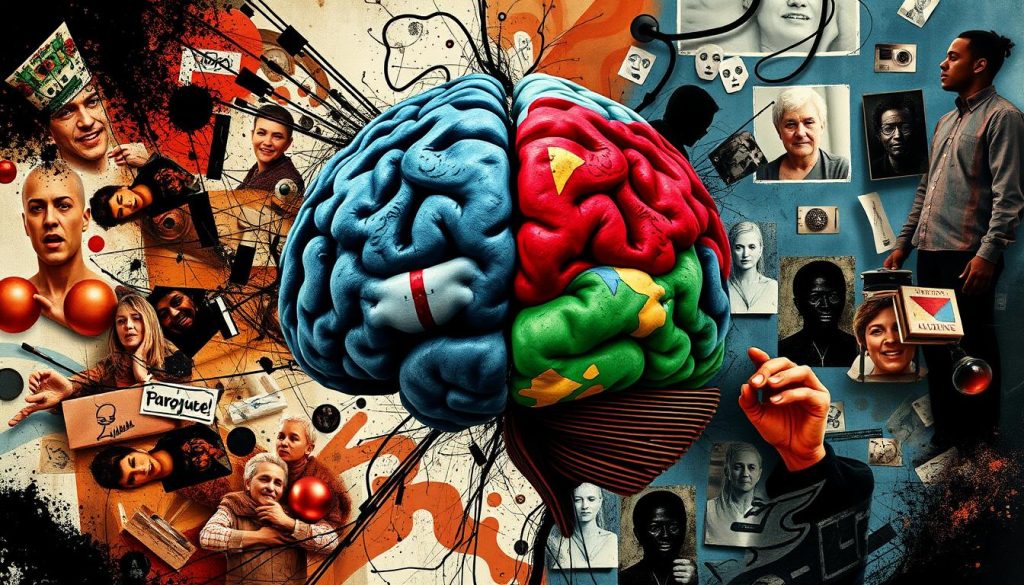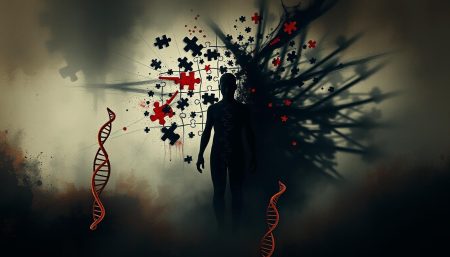Understanding antisocial personality disorder treatment is key to helping those affected. This condition involves long-term patterns of manipulating or violating others’ rights. It’s tough for both patients and their families.
Dealing with antisocial personality disorder requires a caring yet scientifically-backed approach. It combines the latest medical knowledge with a focus on the patient.
People with this disorder may show behaviors that seem hard to overcome. But, the right mix of therapies, medicines, and support can lead to big improvements. This guide offers evidence-based strategies and holistic practices. They help patients, healthcare providers, and caregivers manage the disorder effectively.
Key Takeaways
- Understanding antisocial personality disorder is crucial for developing effective treatment plans.
- Early intervention significantly improves the odds of managing the disorder effectively.
- A synergy of therapeutic methods is often required to address the complexities of antisocial personality disorder treatment.
- Supportive relationships and environments are instrumental in the recovery process.
- Patient engagement and personal responsibility are key factors in the success of managing antisocial personality disorder.
- Long-term management and sustained support play a vital role in maintaining progress.
- Ethical considerations and respect for patient rights are essential in treatment practices.
Understanding Antisocial Personality Disorder
Antisocial personality disorder (ASPD) is often not well understood. It’s important to know what ASPD is and how it affects people. This helps us all understand and feel empathy for those with ASPD.
Definition and Overview
The definition of antisocial personality disorder says it’s a long-term mental condition. It shows through bad behavior and not caring about others. It’s found in the DSM-5 and ICD-10, focusing on ongoing behavior patterns.

Symptoms and Diagnosis
Spotting ASPD symptoms is key for early help. Signs include acting on impulse, being aggressive, and not caring about safety. People with ASPD often don’t feel sorry for hurting others.
- Deception for personal gain or pleasure
- Impulsivity and failure to plan ahead
- Repeated physical fights or assaults
- Reckless disregard for the safety of self or others
- Consistent irresponsibility in work and family environments
- Lack of remorse after hurting or mistreating another
To diagnose, doctors look at behavior and do a psychological test. The diagnostic criteria for ASPD require seeing conduct disorder before 15 and ongoing behavior in adulthood.
The Importance of Early Intervention
It’s vital to tackle antisocial personality disorder (ASPD) early, especially in young people. This can prevent serious psychological and social problems later on. By focusing on early intervention in ASPD, we can change the course of a person’s life. It shows the need for quick and effective actions.
Recognizing Signs in Adolescents
ASPD signs often start in teens and might seem like normal teenage behavior. But spotting adolescent antisocial signs is crucial to stop the disorder from getting worse. These signs include lying a lot, being very aggressive, destroying property, and not feeling sorry for hurting others. Catching these signs early lets us help kids before it’s too late.

Potential Consequences of Delayed Treatment
Not treating ASPD can cause big problems for the person and society. Without treatment, ASPD can lead to more crime, drug use, and trouble making friends. This highlights why we need to find and treat ASPD early. It can really change how antisocial behaviors develop.
| Early Intervention | Outcome Without Intervention |
|---|---|
| Improved social interactions | Isolation and ongoing conflicts |
| Reduced risk of substance abuse | Higher susceptibility to addiction |
| Decrease in criminal activities | Increase in criminal convictions |
| Better management of emotions | Persistent emotional instability |
Looking at the possible paths of ASPD shows why early intervention in ASPD is key. Helping teens early can teach them better ways to deal with feelings and people. This can greatly lessen the personal and social costs of consequences of untreated ASPD.
Therapeutic Approaches to Treating Antisocial Personality Disorder
Looking into treatments for Antisocial Personality Disorder (ASPD), we see the importance of certain therapies. These methods aim to tackle the tough parts of ASPD. They focus on managing behavior and controlling emotions.
Cognitive Behavioral Therapy (CBT)
Cognitive Behavioral Therapy for ASPD works on changing negative thought patterns and behaviors. It helps by fixing distorted thinking. This therapy teaches people to handle triggers better.
Dialectical Behavior Therapy (DBT)
Dialectical Behavior Therapy for ASPD helps with emotional control. It teaches a balanced way to deal with stress and relationships. Patients learn to manage impulses, improve relationships, and control emotions through a structured program.
Group Therapy Benefits
Group therapy is key in treating ASPD. It offers a place to learn social skills and empathy. People with similar issues share experiences and learn from each other in a safe space.
Using these therapies together can lead to better outcomes for ASPD. It’s important to tailor treatments to each person’s needs. This helps them recover and fit back into society.
Medication for Antisocial Personality Disorder
Treatment for antisocial personality disorder (ASPD) includes both psychological therapies and ASPD medication. It’s important to know about the medications used and how to handle their side effects. This is key for successful treatment.
Types of Medications Prescribed
Medications are not the main treatment for ASPD. They are often given to help with symptoms like depression, anxiety, or aggression. The goal of psychopharmacology for antisocial behavior is to help improve social skills and reduce impulsivity and aggression.
Monitoring and Managing Side Effects
Medications can help, but they can also have side effects. It’s crucial to watch these side effects closely. Managing medication side effects is important to avoid making antisocial behaviors worse or affecting treatment success.
| Medication Type | Common Side Effects | Management Strategies |
|---|---|---|
| Antidepressants | Nausea, Fatigue, Agitation | Adjustment of dosage, Timed intake |
| Mood Stabilizers | Weight gain, Drowsiness | Regular monitoring, Lifestyle adjustments |
| Antipsychotics | Dizziness, Sedation, Extrapyramidal symptoms | Use of lowest effective dose, Patient education |
Managing ASPD symptoms with medication requires teamwork between healthcare providers and patients. They work together to find the right dosage and reduce side effects. Regular checks and adjustments are often needed, focusing on both the psychological and medication aspects of treatment.
For detailed info on ASPD medication side effects, it’s best to talk to healthcare providers.

Building a Supportive Environment
Managing Antisocial Personality Disorder (ASPD) gets easier with a supportive environment. This includes family support, creating safe spaces, and community help. Both family and friends, and the wider community, are key in helping someone recover and grow.
Role of Family and Friends
Family support for ASPD is crucial. It builds a network of encouragement and understanding. By adapting how they communicate, setting boundaries, and learning about ASPD, family and friends can make a big difference. This not only helps the person with ASPD but also strengthens family bonds by fostering empathy and patience.
Creating Safe Spaces for Recovery
Creating safe spaces is more than just a physical place. It’s about creating an emotional and psychological environment that supports growth. It’s important to consider the individual’s needs, ensuring they feel secure and supported. This is key in helping them heal, as ASPD makes it hard to understand and connect with others’ feelings.

Community support also plays a big role. It offers places for social interaction and professional help. By using community resources, therapy groups, and social services, families can get more support. This helps build a stronger support system around the individual.
| Support Type | Benefits | Examples |
|---|---|---|
| Family Support | Improves personal interactions, enhances emotional understanding | Regular family meetings, therapy involvement |
| Safe Spaces | Provides environment conducive to therapy and personal reflection | Dedicated personal space at home, access to quiet zones in community centers |
| Community Support | Extends network beyond family, offers diverse perspectives and resources | Participation in community workshops, local support groups |
Lifestyle Changes to Aid Treatment
Making lifestyle changes for ASPD can help a lot. It not only goes well with medical treatment but also boosts mental and physical health. This part talks about simple ways to make your daily life healthier. By doing so, you can control your actions better.
Healthy Coping Mechanisms
Managing ASPD is easier with healthy coping methods. These can help deal with stress and stop impulsive actions. Mindfulness and stress exercises are key. They help you know yourself better and control your actions, which is hard for those with ASPD.

The Role of Exercise and Nutrition
Exercise and good food are key for mental health with ASPD. They make you feel better physically and mentally. Exercise makes you feel good by releasing special chemicals in your brain. Also, eating right helps your brain work better and can change how you feel and act.
- Regular exercise: Aim for at least 30 minutes of moderate exercise most days of the week.
- Balanced nutrition: Include a variety of nutrients in your diet, focusing on vegetables, fruits, lean proteins, and whole grains.
These lifestyle changes are very important for managing ASPD. They help you deal with the disorder’s challenges. This way, you can feel better overall.
The Role of Professional Mental Health Providers
When treating Antisocial Personality Disorder (ASPD), knowing the roles of mental health experts is key. Psychiatrists and psychologists are at the heart of ASPD treatment. They diagnose, treat, and guide patients through the long journey of managing this disorder.
Psychiatrists vs. Psychologists
Deciding between a psychiatrist and a psychologist depends on the patient’s needs. Psychiatrists are doctors who can write prescriptions and offer therapy. On the other hand, psychologists focus on therapy and can’t prescribe drugs. Both can help with therapy and assessments, but their methods differ.
| Role | Education | Treatment Methods |
|---|---|---|
| Psychiatrist | Medical Degree (MD) | Medications, Psychotherapy |
| Psychologist | Ph.D. or Psy.D | Psychotherapy, Behavior Modification |
Importance of Finding the Right Therapist
Finding a therapist for ASPD is crucial. They should specialize in personality disorders. This expertise helps them understand and manage ASPD’s complexities better.
A strong therapeutic relationship is key to success. Patients with ASPD need a supportive and understanding therapist. This relationship is the foundation of effective treatment.
In conclusion, the success of ASPD treatment depends on matching the patient’s needs with the right mental health professional. Knowing the roles of psychiatrists and psychologists and the importance of a specialized therapist is essential. It helps in managing and recovering from ASPD.
Addressing Co-occurring Disorders
When treating antisocial personality disorder (ASPD), it’s key to consider other disorders that often come with it. These conditions can make treatment harder and affect how well a patient does.
Common Co-existing Mental Health Challenges
People with ASPD often deal with depression, anxiety, and substance abuse. It’s important to spot these other disorders. This way, treatment can tackle both ASPD and the other mental health issues.
Integrated Treatment Strategies
Handling co-occurring disorders with ASPD needs a team effort. This means combining different treatments like therapy, medication, and support. Each plan should fit the person’s specific needs.
A good treatment plan might include therapy, medicine, and community support. This mix helps manage symptoms and gets to the root of the problems. It helps people recover for the long term.
- Behavioral Therapy: Works on changing bad thoughts and actions.
- Pharmacotherapy: Uses medicine, like antidepressants, to control symptoms.
- Support Systems: Helps with groups or one-on-one counseling to prevent relapse.
Integrated treatment plans offer a whole-person approach. They improve outcomes in complex cases. This requires teamwork among healthcare experts to ensure care is well-coordinated.
Legal and Ethical Considerations
Dealing with Antisocial Personality Disorder (ASPD) brings up many legal and ethical issues. These issues mainly focus on patient rights and fair treatment. Finding the right balance between legal rules and patient needs is crucial.
Understanding Patient Rights
Patient rights are key in treating personality disorders. These rights make sure patients are treated with respect and dignity. They include getting full information about their condition and treatment options.
Healthcare providers must respect these rights. This means explaining ASPD, its risks, and treatment choices clearly. Patients also have the right to say no or choose other treatments.
Ethical Dilemmas in Treatment
Dealing with ASPD raises big ethical questions. Issues like keeping secrets and preventing harm to self or others are common. Healthcare teams must work together to find the best solution.
Legal rules also play a big part in treatment decisions. This includes involuntary treatment or using restraints. It’s important to follow both legal and ethical guidelines.
| Issue | Ethical Consideration | Legal Consideration |
|---|---|---|
| Informed Consent | Ensuring comprehension and voluntariness in patients with cognitive impairments | Adhering to state laws on patient competency and consent |
| Risk of Harm | Balancing patient autonomy with duty to protect the patient and others | Legal obligations to report imminent threats, varying by state |
| Confidentiality | Maintaining privacy except in cases where withholding information poses a serious risk | Compliance with HIPAA and state-specific privacy laws |
Healthcare providers face a big challenge. Every decision can have big ethical and legal effects. They must keep up with legal and ethical changes to provide the best care.
The Importance of Patient Engagement
Effective treatment of Antisocial Personality Disorder (ASPD) relies on engaging patients with ASPD actively. This means helping them understand their role and accept therapy. Methods that increase patient involvement can greatly improve treatment success.
Motivational Interviewing Techniques
Motivational interviewing for behavior change is key in treating ASPD. It’s a patient-focused method that helps overcome doubts and boosts motivation for change. By using empathetic talks and respecting the patient’s choices, professionals help patients change bad behaviors.
- Exploring the consequences of current behaviors
- Highlighting the discrepancies between patients’ goals and their current situations
- Using open-ended questions to facilitate self-reflection
- Affirming the patient’s strengths and past successes
Fostering a Sense of Responsibility
In responsibility in ASPD treatment, motivational interviewing helps patients see their role in change. Building trust between the patient and therapist is vital. It makes patients more likely to change their ways.
| Technique | Focus | Expected Outcome |
|---|---|---|
| Reflective Listening | Understand patient’s perspective | Increase engagement and readiness to change |
| Summarization | Reinforce discussed points | Enhance patient’s clarity and decision-making |
| Affirmation | Validate efforts and strengths | Boost confidence and self-efficacy |
Using these methods, professionals not only engage but also empower patients. This leads to important behavior changes in ASPD management. Such engagement fosters a lasting commitment to personal growth and rehabilitation, making therapy a chance for deep personal change.
Long-term Management of Antisocial Personality Disorder
Managing antisocial personality disorder (ASPD) is a long-term journey. It’s not just about short-term fixes. It’s about ongoing personal growth and staying on track with treatment.
Keeping up with treatment means making lasting changes. It’s about learning new behaviors and staying in therapy. This helps keep progress going and supports personal growth.
Strategies for Sustaining Progress
Recovery from ASPD needs a mix of strategies. Cognitive behavioral therapy helps keep positive behaviors strong. Social skill training helps build better relationships.
Having the right resources is key. This includes help finding jobs and regular check-ins with mental health professionals. These steps help stay on track and adjust plans as needed.
Importance of Continued Support and Resources
Support is crucial for managing ASPD long-term. Support groups and family counseling offer the encouragement needed to avoid bad habits. They help create a strong support system.
For more information on ASPD, check out Cleveland Clinic’s resources. They provide detailed insights into managing and supporting ASPD. With the right support and resources, people with ASPD can build a resilient future.
FAQ
Q: What are the main treatments for Antisocial Personality Disorder (ASPD)?
A: ASPD treatment often combines psychotherapy, like Cognitive Behavioral Therapy (CBT) and Dialectical Behavior Therapy (DBT). Medication helps manage symptoms. Group therapy also plays a key role, helping with social skills and empathy.
A team of professionals is best for managing ASPD.
Q: How can I tell if someone has Antisocial Personality Disorder?
A: To diagnose ASPD, a detailed psychological evaluation is needed. This includes looking at a person’s history and behavior against the DSM-5 and ICD-10 criteria. Signs include ignoring right and wrong, being deceitful, and lacking remorse.
Q: Why is early intervention important in treating ASPD?
A: Early treatment of ASPD helps prevent severe problems. It can stop legal issues, relationship troubles, and other disorders. Spotting ASPD early in teens can lead to better results.
Q: Are there specific medications used to treat ASPD?
A: There’s no specific drug for ASPD. But, some meds can help with symptoms or other disorders. It’s important for doctors to watch for side effects.
Q: What role do family and friends play in treating ASPD?
A: Family and friends are very important. They can support positive behaviors and treatment. They help create safe spaces for recovery and offer ongoing support.
Q: Can lifestyle changes help in managing ASPD?
A: Yes, lifestyle changes can help. Regular exercise, a healthy diet, and good coping skills are beneficial. These changes can improve overall well-being and support treatment.
Q: Why is the choice of mental health providers important in treating ASPD?
A: Choosing the right mental health provider is key. Experts in personality disorders know how to treat ASPD best. A good therapist can make a big difference in treatment success.
Q: How are co-occurring disorders treated alongside ASPD?
A: Treating ASPD with other disorders involves a holistic approach. This means addressing both the personality disorder and the other mental health issues at the same time. This approach improves treatment results.
Q: What legal and ethical considerations arise in the treatment of ASPD?
A: Treating ASPD raises legal and ethical issues. These include patient rights, consent, privacy, and safety. Clinicians must follow laws and ethics while making treatment decisions.
Q: How does patient engagement affect the treatment of ASPD?
A: Patient engagement is crucial in ASPD treatment. Motivated patients are more likely to follow treatment plans. Techniques like motivational interviewing can help patients stay on track.
Q: What strategies support the long-term management of ASPD?
A: Long-term ASPD management involves ongoing therapy and using skills learned from treatments. A supportive environment, medication, and consistent support are also important. Access to resources is key.

















